Deadline: 15-Apr-2024
The U.S. Department of State, Office of International Religious (J/IRF) announces an open competition for organizations interested in submitting applications for projects that support tolerance building and advocacy to increase respect and government protections for the religious freedom of Indigenous and Afro-descendant communities in the Western Hemisphere or Indigenous communities in South Asia.
J/IRF’s goal is twofold: 1) Improve inclusion of Indigenous people and practitioners of African based religions in their communities, free from social discrimination based on their spiritual and belief practices; 2) Support diverse coalitions of civil society and members of Indigenous and/or Afro-descendant communities to advocate in domestic, regional, and international fora to advance government protections to allow members of Indigenous populations and practitioners of African-based religions to freely exercise their right to FoRB.
Funding Information
- Total Funding Ceiling: $1,500,000 per application
- Total Funding Floor: $750,000 per application
- Anticipated Number of Awards: 1-3
- Period of Performance: minimum of 18 months
- Anticipated Time to Award, Pending Availability of Funds: 6-9 months after NOFO closes
Program Outcomes
- Program outcomes may include but are not limited to:
- Engagement and dialogue with members of Indigenous communities and/or practitioners of African-based religions provide an opportunity for coordination and collective action to integrate FoRB challenges for Indigenous persons and/or practitioners of African-based religions in broader FoRB advocacy, including in bilateral discussion and multilateral fora.
- Members of Indigenous communities and/or practitioners of African-based religions and civil society increase awareness of the value and importance of religious pluralism with mutual respect and inclusion for all.
- Civil society actors build stronger networks of allies with a diverse set of actors and stakeholders to increase trust with members of Indigenous communities and/or practitioners of African-based religions.
- Diverse coalitions of civil society actors take collective action to promote social awareness of issues that impede the ways of life and sacred traditions of Indigenous persons and/or practitioners of African-based religions.
- Diverse coalitions of civil society raise FoRB protections of members of Indigenous communities and/or practitioners of African-based religions under international and multilateral human rights declarations, conventions, and mechanisms.
- Governments are responsive to advocacy to protect FoRB of members of Indigenous and/or practitioners of African-based religions.
- Government and legal actors reduce discriminatory laws and practices.
Activities
- Program activities may include, but are not limited to, the following examples:
- Increase awareness of spirituality of members of Indigenous communities and/or practitioners of African-based religions and the FoRB challenges they face among faith[1]based groups civil society through dialogue(s) and/or exchange with members of Indigenous communities or practitioners of African-based religions.
- Develop sustainable or support existing advocacy coalitions or networks focused on promoting FoRB for all to actively integrate Indigenous community members or practitioners of African-based religions into FoRB advocacy efforts, including before domestic, regional, and multilateral/international audiences.
- Advocate with government interlocutors on FoRB of members of Indigenous communities and/or practitioners of African-based religions in domestic meetings and regional and multilateral fora.
- Facilitate opportunities for leaders across diverse groups to connect, identify shared goals, and consider collaborative efforts to respond to challenges facing members of Indigenous communities and/or practitioners of African-based religions.
- Create space and opportunities for like-minded groups and allies to connect and coordinate on integration of FoRB challenges facing members of Indigenous communities and/or practitioners of African-based religions in advocacy efforts
Eligibility Criteria
- J/IRF welcomes applications from U.S.-based and foreign-based non-profit organizations/nongovernmental organizations (NGO) and public international organizations; private, public, or state institutions of higher education; and for-profit organizations or businesses. J/IRF’s preference is to work with non-profit entities; however, there may be some occasions when a for-profit entity is best suited.
- Applications submitted by for-profit entities may be subject to additional review following the panel selection process. Additionally, the Department of State prohibits profit to for-profit or commercial organizations under its assistance awards.
Criteria
- J/IRF anticipates awarding 1-3 programs for the below specified Western Hemisphere or South Asian countries. Applicants may submit one application as the prime awardee per target region.
- Applicants should identify 1-3 countries within either the Western Hemisphere or South Asia countries specified below. Proposals should not include countries from across regions.
- Western Hemisphere: Bolivia, Colombia, Ecuador, Guatemala, Honduras, Mexico, Peru
- South Asia: Bangladesh, India, Nepal
For more information, visit Grants.gov.






























